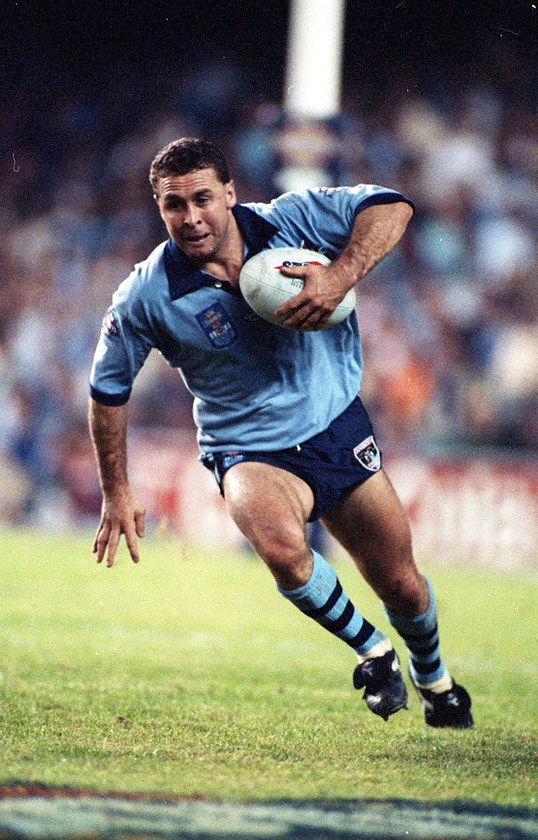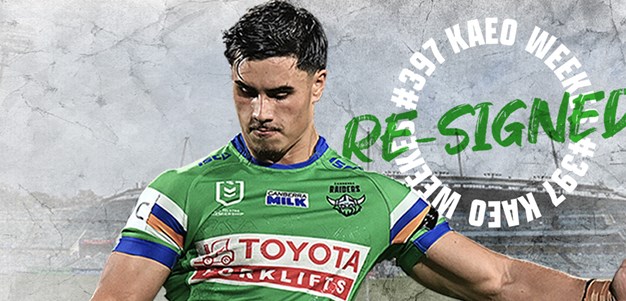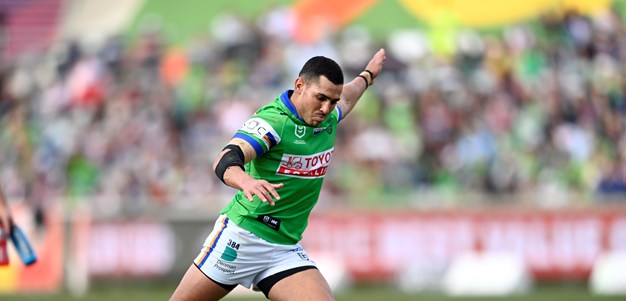Ricky Stuart has achieved more in rugby league than most will in several careers, both as a player and now as a coach of the next generation of superstars.
But for all of the individual honours, Kangaroos tours and premiership victories, he won't be satisfied with his resume unless he adds another trophy to the list as coach of his beloved Canberra Raiders.
Stuart is a strong chance of adding another honour to his list of achievements after being nominated as one of the 25 players in line to be named as the next six members of the NRL Hall of Fame this year.
"I want to win another comp, that's the only thing I think of. Doing the best for the Raiders and winning a comp. I won't be happy if I finish my career if I haven't won a comp [as coach] at the club," he said.
"I don't want to sound rash, I am very proud of what I've achieved as a player, I'm very proud of how I have handled tough situations because I haven't changed as a man. But if I could give all of the success back to get one more, I'd go close to swapping, just to get one more."

The journey from a four-old playing with a footy in Queanbeyan to arguably the best halfback of his generation could have been derailed by the "other" rugby code, according to Stuart.
"Brother Bob Wallace who was my headmaster and first XV coach at St Edmunds College made the decision for me it was going to be rugby union, or I had to leave school," he said.
"For the next five years I focused on rugby union and I was very fortunate to make the 1987 Wallabies tour. Unfortunately, I only sat on the bench for a Test match I didn't get on but that was one of my great highlights as a young footballer, making the Wallaby tour."
The 13-a-side game was always in the background, calling to him, as if it was the best arena where he could properly fulfill his potential.
Blessed with a silky set of skills and a burning competitive desire, Stuart started his journey after a pre-season with Manly before receiving a call from Warren Ryan about possibly joining the Balmain Tigers.
But the lure to join a club just six years into its existence proved to be too much as he took up a handshake agreement with then Canberra chairman John McIntyre.
Stuart did not know it at the time, but he would be joining what would soon become one of the NRL's earliest versions of a super team, with the next few years being what he called a "magical era".
"I was fortunate enough to play with some players who we will hear about for the next 50 years," Stuart said.
"Daley, Clyde, Walters, Meninga and I have missed a few, Glenn Lazarus I believe was one of the best front-rowers I've seen play the game.
"So, there are players there I was inside or outside [of] that makes me feel so privileged because I know those players will still be spoken about in the long time to come and I can talk to my grandchildren about those people I played with."
During Stuart's 11 years in Canberra, the Raiders juggernaut only failed to make the finals once, winning three premierships along the way.
"I don't think anybody would understand how hard that was until you're in the game today and know how it is to get to one," the 1990 Churchill Medallist said.
"In the days gone by when I played, it was more of a pact you had amongst yourself to stay with each other and stay with the club.
"We had a lot of stability and we kept our core for a number of years and the salary cap today makes it a little bit more difficult to do that. Success brings more money for players, more profile so they're wanted more by other clubs so it's hard to keep your nucleus of your team."
For all of the star power on show in the nation's capital during the formative years of Stuart's career, it was the role players that turned those sides from good to great.
For every piece of individual brilliance from rugby league singularities such as Bradley Clyde, Mal Meninga, Steve Walters or Laurie Daley came unquantifiable but equally game-changing plays from the likes of Dean Lance, Gary Coyne, Ashley Gilbert and Chris O'Sullivan.
"They're the most important people, they're all greats to me," Stuart said.
"One thing we were very good at here [in Canberra], we didn't benchmark anybody as a great compared to just a player.
"We were all on the same page, we had a coach who kept our egos in check in Timmy Sheens, who was one of the great coaches.
"To be quite honest, that was probably one of the biggest parts of our success was that we played for each other and we were very close.
"Those guys who can be called the 'glue', they're more important than the superstars, you need them to keep the superstars doing what they do."
Stuart's career was not all champagne and celebrations, with one of the greatest unanswered questions in Raiders history coming at the end of the 1993 regular season.
Hall of Fame & Immortals program explained
Canberra's chances of adding another piece of silverware came to a screeching halt as Stuart writhed in pain on the Bruce Stadium turf, after suffering a broken leg against Parramatta in the second-last game of the season.
Were it not for the injury, Stuart believes that side could have gone all of the way.
"I really felt for those young halves trying to come in and take up the slack, so it was more that we couldn't find a replacement with experience and that was probably the biggest letdown for us a footy team," he said.
"We had a wonderful year in 1993, just a bit of poor luck at the end of it."
Stuart's coaching career has in many ways mirrored the highs and lows of his playing days.
From a premiership in his rookie year with the Sydney Roosters in 2002, to less than desirable exits from Cronulla and Parramatta through to losing the Kangaroos job in 2008 in what he calls the biggest mistake in his career, his time coaching in the NRL has given him a new set of challenges.
"I am very proud of the longevity I've had in the game, and I'm not finished yet," he said.
"I am proud I have handled very tough times because a lot of clubs I've taken over I've had to be a change merchant to change a culture or rosters.
"There's been some tough and dark days, late at Cronulla, early in my time at Parramatta. When I got the job here in Canberra, with the support from a senior level, a supportive board and management, they let me do my job.
"I believe we changed very quickly and I think we've got a very competitive football team which was my goal when I got here."
However, the job is far from done in Canberra for Stuart.
He was there for the club's inaugural premiership and if he has his way, his fingerprints will be all over the latest title, hopefully for Ricky's Raiders, in the not too distant future.








